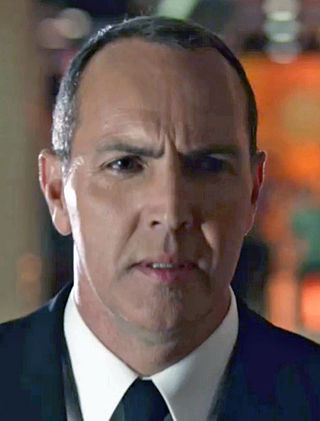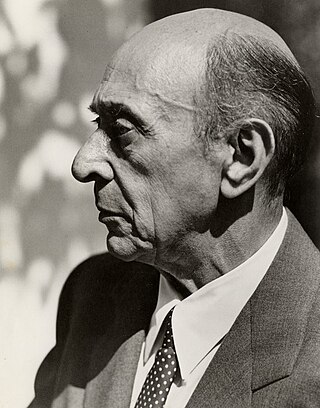Related Research Articles

Expressionism is a modernist movement, initially in poetry and painting, originating in Northern Europe around the beginning of the 20th century. Its typical trait is to present the world solely from a subjective perspective, distorting it radically for emotional effect in order to evoke moods or ideas. Expressionist artists have sought to express the meaning of emotional experience rather than physical reality.

The Mummy is a 1999 American action-adventure horror comedy film written and directed by Stephen Sommers, starring Brendan Fraser, Rachel Weisz, John Hannah and Arnold Vosloo in the title role as the reanimated mummy. It is a remake of the 1932 film of the same name. The film follows adventurer Rick O'Connell as he travels to Hamunaptra, the City of the Dead, with librarian Evelyn Carnahan and her older brother Jonathan, where they accidentally awaken Imhotep, a cursed high priest with supernatural powers.

The New Objectivity was a movement in German art that arose during the 1920s as a reaction against expressionism. The term was coined by Gustav Friedrich Hartlaub, the director of the Kunsthalle in Mannheim, who used it as the title of an art exhibition staged in 1925 to showcase artists who were working in a post-expressionist spirit. As these artists—who included Max Beckmann, Otto Dix, George Grosz, Christian Schad, Rudolf Schlichter and Jeanne Mammen—rejected the self-involvement and romantic longings of the expressionists, Weimar intellectuals in general made a call to arms for public collaboration, engagement, and rejection of romantic idealism.

German expressionist cinema was a part of several related creative movements in Germany in the early 20th century that reached a peak in Berlin during the 1920s. These developments were part of a larger Expressionist movement in north and central European culture in fields such as architecture, dance, painting, sculpture and cinema.

Arnold Vosloo is a South African-American actor. He is famous for roles such as Imhotep in The Mummy (1999) and The Mummy Returns (2001), Colonel Coetzee in Blood Diamond (2006), Pik van Cleef in Hard Target (1993), Dr. Peyton Westlake in Darkman II (1995) and Darkman III (1996), Zartan in G.I. Joe: The Rise of Cobra (2009) and G.I. Joe: Retaliation (2013), sniper Jacob Broadsky in the TV series Bones and terrorist Habib Marwan in the fourth season of 24.

The term expressionism "was probably first applied to music in 1918, especially to Schoenberg", because like the painter Wassily Kandinsky (1866–1944) he avoided "traditional forms of beauty" to convey powerful feelings in his music. Theodor Adorno interprets the expressionist movement in music as seeking to "eliminate all of traditional music's conventional elements, everything formulaically rigid". This he sees as analogous "to the literary ideal of the 'scream.' " As well Adorno sees expressionist music as seeking "the truthfulness of subjective feeling without illusions, disguises or euphemisms". Adorno also describes it as concerned with the unconscious, and states that "the depiction of fear lies at the centre" of expressionist music, with dissonance predominating, so that the "harmonious, affirmative element of art is banished". Expressionist music would "thus reject the depictive, sensual qualities that had come to be associated with impressionist music. It would endeavor instead to realize its own purely musical nature—in part by disregarding compositional conventions that placed 'outer' restrictions on the expression of 'inner' visions".

Expressionist architecture was an architectural movement in Europe during the first decades of the 20th century in parallel with the expressionist visual and performing arts that especially developed and dominated in Germany. Brick Expressionism is a special variant of this movement in western and northern Germany, as well as in the Netherlands.
The following outline is provided as an overview of and topical guide to the history of painting:
Throughout history there have been several mummy forgeries.
New Objectivity was an art movement that emerged in Germany in the early 1920s as a counter to expressionism. The term applies to a number of artistic forms, including film.

The Mummy is a 2017 American fantasy action-adventure film directed by Alex Kurtzman and written by David Koepp, Christopher McQuarrie, and Dylan Kussman, with a story by Kurtzman, Jon Spaihts, and Jenny Lumet. A reboot of the Mummy franchise as part of Universal's scrapped Dark Universe, it stars Tom Cruise as U.S. Army Sergeant Nick Morton, a soldier of fortune who accidentally unearths the ancient tomb of entrapped Egyptian princess Ahmanet. Annabelle Wallis, Jake Johnson, Courtney B. Vance, and Russell Crowe also star.

Karl Otten was a German expressionist writer and broadcaster.
Death the Victor is a 1920 German silent film directed by Nils Olaf Chrisander and starring Uschi Elleot, Werner Krauss and Johannes Riemann.
Killing Silence is a 1920 German silent film directed by Artur Holz.
The Eyes of the Mask is a 1920 German silent film directed by Karl Gerhardt and starring Lil Dagover.
The Hunt for Death is a 1920 German silent film directed by Karl Gerhardt and starring Lil Dagover. It was followed by three sequels.
The Sign of the Malay is a 1920 German silent film directed by Carl Heinz Boese. It was shot at the Babelsberg Studios in Berlin, then controlled by Decla-Bioscop.

Nerves (German:Nerven) is a 1919 German silent film directed by Robert Reinert and starring Eduard von Winterstein, Lia Borré and Erna Morena.

Shulamith Behr was a senior lecturer, and Honorary Research Fellow at the Courtauld Institute of Art. She was a specialist in 20th Century German Expressionism, with a particular interest in German and Swedish women artists.
References
- ↑ Expressionism Reassessed p.93